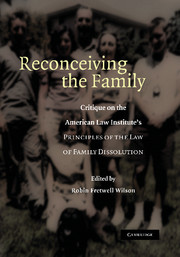 Reconceiving the Family
Reconceiving the Family Book contents
- Frontmatter
- Contents
- Acknowledgments
- Foreword, by Mary Ann Glendon
- List of Contributors
- Introduction
- PART ONE FAULT
- PART TWO CUSTODY
- PART THREE CHILD SUPPORT
- PART FOUR PROPERTY DIVISION
- PART FIVE SPOUSAL SUPPORT
- PART SIX DOMESTIC PARTNERSHIP
- 14 Domestic Partnership and Default Rules
- 15 Private Ordering under the ALI PRINCIPLES: As Natural as Status
- 16 Marriage Matters: What's Wrong with the ALI's Domestic Partnership Proposal
- 17 Domestic Partnerships, Implied Contracts, and Law Reform
- PART SEVEN AGREEMENTS
- PART EIGHT JUDICIAL AND LEGISLATIVE PERSPECTIVES
- PART NINE INTERNATIONAL REFLECTIONS
- Afterword: Elite Principles: The ALI Proposals and the Politics of Law Reform, by Carl E. Schneider
- Index
15 - Private Ordering under the ALI PRINCIPLES: As Natural as Status
Published online by Cambridge University Press: 25 January 2010
- Frontmatter
- Contents
- Acknowledgments
- Foreword, by Mary Ann Glendon
- List of Contributors
- Introduction
- PART ONE FAULT
- PART TWO CUSTODY
- PART THREE CHILD SUPPORT
- PART FOUR PROPERTY DIVISION
- PART FIVE SPOUSAL SUPPORT
- PART SIX DOMESTIC PARTNERSHIP
- 14 Domestic Partnership and Default Rules
- 15 Private Ordering under the ALI PRINCIPLES: As Natural as Status
- 16 Marriage Matters: What's Wrong with the ALI's Domestic Partnership Proposal
- 17 Domestic Partnerships, Implied Contracts, and Law Reform
- PART SEVEN AGREEMENTS
- PART EIGHT JUDICIAL AND LEGISLATIVE PERSPECTIVES
- PART NINE INTERNATIONAL REFLECTIONS
- Afterword: Elite Principles: The ALI Proposals and the Politics of Law Reform, by Carl E. Schneider
- Index
Summary
The Principles begin by observing that “[o]ne expects a nation's family law to reflect its cultural values.” But left unspecified are the particular cultural values that the Principles incorporate. Freedom of contract, also known as private ordering, is one important cultural value that is expressed. This chapter identifies a number of provisions that incorporate private ordering, namely the ALI's domestic partnership, parenthood by estoppel, and de facto parenthood proposals, and articulates reasons that deference to private ordering makes sense. The strengths of private ordering are both functional and linguistic. Functionally, family law doctrine already defers to private ordering in many instances, and indeed increasingly tends toward privatization. Moreover, private ordering can facilitate equality in families and accounts for the fact that people form families in different ways.
The linguistic point requires a bit more explanation. Abstract ideas, such as family – understood as the kind of social affiliation that the law recognizes as legitimate – can only be discussed in metaphorical terms because it is difficult, if not impossible, to explain complex concepts like intimate affiliation and legal recognition without resorting to other concepts. While metaphors imperfectly capture the notion of family and other abstractions, they are the best tools we have, making analysis of their mechanics particularly important. Metaphors work by identifying a target problem and then identifying a source analog to understand it.
- Type
- Chapter
- Information
- Reconceiving the FamilyCritique on the American Law Institute's Principles of the Law of Family Dissolution, pp. 284 - 304Publisher: Cambridge University PressPrint publication year: 2006
- 15
- Cited by


